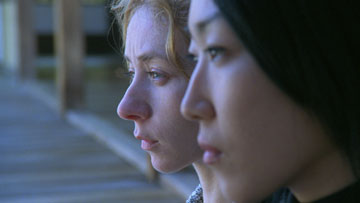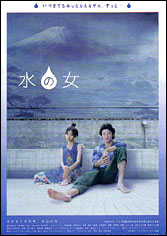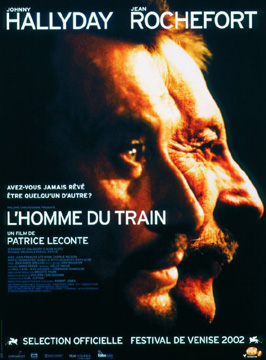Fear and Trembling (imdb | official site)
In Fear and Trembling, we follow Amelie, a young Belgian woman who, born in Japan, determines to return to the country which made such an impression upon her as a youth. She obtains a 1 year contract to translate for a Japanese multinational, and there takes her place in the elaborate, hierarchical world of Japanese business.

It is a playful movie, because Amelie is playful, and full of imagination. We see the office as Amelie sees it; her enemies are our enemies–or are they?
One funny moment: while being bawled out by her boss for making a mistake, Amelie muses, “I now understand much about Japanese history. I would invade Manchuria, bomb Pearl Harbor, lead suicide attacks in warplanes, if it would make the yelling stop.”
It’s a work that’s at once deeply comical, and thought provoking. In the Q&A, the director points out that Japan is a mirror in which we can see ourselves. That is certainly Amelie’s experience, and it echoes Donald Richie, who calls Japan “The Great Mirror”. (btw, Donald just turned 79 and is recovering from a heart attack he had while visiting relatives in Florida. Get well soon!)
The movie is based on a book, famous in France. The author chose not to be involved in the movie, though the director (as is his custom) gave her every opportunity. She did see the first cut and liked it.
The film was shot in Paris, in a studio. The Japanese actress, Tsuji Kaori, is actually a fashion model in Paris. The ensemble cast was either living in Paris or came out for the shoot.
The director was questioned about the extremity of some of the scenes. He assured the audience that this was realistic–it was in the book, and the Japanese cast felt it was authentic. Indeed, the cast pushed him to make it even more extreme~~proposing, in one scene, that Amelie serve tea by kneeling on the ground. The director was pleased to see that the Japanese actors were willing to make it as realistic as possibe, but on that point, since it was not in the book, did not put it in.
I felt that most of the audience didn’t know when to laugh. I thought it was hilarious, but maybe the cultural disconnect made people uncomfortable. My friend (who works in Int’l Marketing in Asia) made the comment after the film: “Funny, but all too true.” I agreed. To me, the movie was a light hearted look at the follies of a foreigner in a Japanese “Office Space”, but certainly no indictment of Japanese culture as a whole.
I’d give this 3/4 stars.
 Woman of Water is to be savoured because it is visually stunning, with a bounty of unique and creative images.
Woman of Water is to be savoured because it is visually stunning, with a bounty of unique and creative images. The movie was introduced by Roger Ma, a programmer at the festival who I quite like. He intro’d the movie by warning us that the credits occur in the middle of the movie (and not to walk out then) and that there was some quite explicitstuff later on, if we wanted to hang around.
The movie was introduced by Roger Ma, a programmer at the festival who I quite like. He intro’d the movie by warning us that the credits occur in the middle of the movie (and not to walk out then) and that there was some quite explicitstuff later on, if we wanted to hang around.

 Shot in an almost documentary style, on grainy Super8 or probably 16mm, and blow to 35mm.
Shot in an almost documentary style, on grainy Super8 or probably 16mm, and blow to 35mm. Full of atmosphere. Clickety-clack of railroad tracks introduce us to the world of this movie, quiet, somewhat gritty, blue-toned.
Full of atmosphere. Clickety-clack of railroad tracks introduce us to the world of this movie, quiet, somewhat gritty, blue-toned.